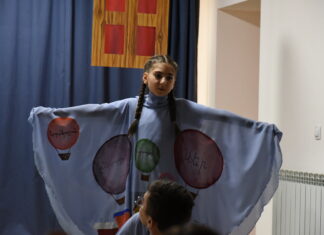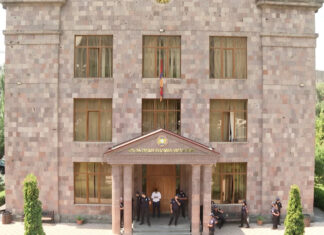By Joel Kesselbrenner
YEREVAN — Elvina Asatryan is a senior at the Agribusiness Teaching Center (ATC) in Yerevan, and once she finishes her education, she intends to completely redesign the Armenian wine industry. ACT is the flagship academic program at the International Center for Agribusiness Research and Education (ICARE). ICARE is partnered with Texas A&M University in order to provide Armenian students with a quality agribusiness education using western teaching methods. All the courses are taught in English and students are given first hand agribusiness experience through internship programs. For her internship, Asatryan is working at ICARE, examining Armenia’s agricultural exports and imports, and the accompanying government policies. I sat down with her one afternoon to discuss her experiences at ATC and her plans for the future. Asatryan is articulate and clearly very determined; I left with the impression that I had just met the future of Armenia’s wine industry.
Asatryan is from the province of Vyots Dzor, one of the least industrialized areas in Armenia. From childhood, agriculture played a large role in her life and she always knew it was a field she wanted to go into. Her father was involved in winemaking and after her grandfather told her that there were no women in the wine business, she resolved to become the first businesswoman in the wine sector. In the pursuit of this dream, she left home and attended school in Yerevan at the Armenian National Agrarian University. Unfortunately, Asatryan found the school to be a bit lacking and was not convinced that she was ready for the workforce. Her university education had forced her to study hard and memorize a great deal, but it had not challenged her ways of thinking. At ATC, she found the education opportunity she had been lacking. Not only did ATC imbue her with public speaking and networking skills, but it fundamentally changed her ways of thinking. For so long she had been simply memorizing material and not engaging with it in a meaningful way. At ATC, she was able to go beyond theory and apply her skills and knowledge in a real-world context. She feels like a far more confident, capable person, and this really shines through just from talking to her.
After Asatryan finishes at ATC, the next step in her journey will take her to California. During her studies, Elvina became aware of the unique properties and tastes of Armenian wine. However, Armenian wine does not enjoy the same widespread acclaim as wines from Western Europe. Many Armenian wine companies have found success in overseas markets but Armenian wines on the whole are largely unknown. Elvina believes she has found a remedy for this problem and intends to unite all Armenian wine companies through the creation of an Armenian wine association. This is the project that will bring her to America. Elvina will intern in the California wine sector, where she hopes to acquire the first-hand experience needed to unite all of Armenia’s wineries under one banner. Elvina has no delusions that it will be easy but she has already left her home once to study and is fully prepared to do it again.
For me, what is most remarkable about Elvina is that she is doing all of this for the good of her country. Not once did she mention her own personal benefit. Likewise, she feels indebted to ATC, and hopes to pay it back in full. Elvina was only able to attend ATC in the first place because she qualified for a scholarship. On her own she would not have been able to afford it. Once she establishes herself in wine, Elvina has every intention of establishing her own ATC scholarship, which will help students just like her get the break they need. Since its inception, ATC has been a breeding ground for leaders in agribusiness, and Elvina might possibly become the most successful of them all. In a country that has struggled with economic stagnation, ATC and the pioneers it produces may be the brightest hope for an improved economy.
(Joel Kesselbrenner is a sophomore at Brown University (www.brown.edu). This summer he interned in Armenia at the International Center for Agribusiness Research and Education (ICARE). The center in an educational NGO partnered with Texas A&M University that provides young Armenians with an agribusiness education based off Western teaching methods. ICARE’s flagship program is the Agribusiness teaching center (ATC), which offers a bachelor’s degree and a master’s degree in Agribusiness. As part of his internship, he interviewed a handful of successful students and alumni and wrote up short profiles of their lives.)








